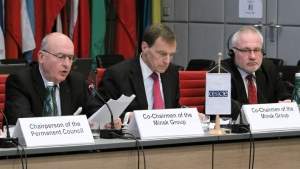
Zurich Protocols: No Substitute for American Strategy In South Caucasus
Publication: Eurasia Daily Monitor Volume: 8 Issue: 228
By:

The “disbalance of interests” (see EDM, December 15), favoring Russia over the United States in the South Caucasus, used to be offset by superior US resources, attractiveness and credibility. But that offset has diminished as US policy turned toward de-prioritizing this region (compared with the earlier level of Washington’s engagement). Lacking a strategy for the South Caucasus, the US has taken a back seat to Russia at least since 2008 in the negotiations on the Armenia-Azerbaijan conflict.
Washington had reduced its profile and role on this issue (and on South Caucasus regional security writ large) already during the second term of the Bush administration. It folded the Karabakh conflict portfolio into other portfolios within the State Department; it handled this issue through medium-level diplomats versus Russia’s top leaders; and it separated this issue from US regional strategy, which was itself fading out. Under the Obama administration, the policy drift grew more pronounced, with domestic politics distorting US diplomacy on the Armenia-Azerbaijan conflict.
The OSCE’s “Minsk Group” co-chaired by Russia, the United States, and France, mediates between Armenia and Azerbaijan. The three co-chairing countries are home to the largest Armenian diasporas worldwide, with significant electoral strength. Politicians’ calculations tied to these voter blocs affect US and French diplomacy on the Armenia-Azerbaijan conflict and related issues.
Turkey remains the only major player with pro-Azerbaijan sympathies. Turkey is a member of the original Minsk Group, but not of the co-chairmanship that runs the process (which is itself eclipsed by Russia at present). The delegation of authority, from the original Minsk Group to the triple co-chairmanship, has barred Turkey from a direct role in these negotiations. Ankara seeks a role commensurate with its regional strength and influence. Minister of Foreign Affairs, Ahmet Davutoglu, told the OSCE’s year-end meeting that the Armenia-Azerbaijan unresolved conflict “undermines the OSCE’s credibility. The Minsk Group needs to be invigorated with the active contribution of its member countries,” i.e. Turkey (Anatolia news agency, December 7).
The Obama administration, however, seems ready to countenance the status quo in that unresolved conflict. This intention is apparent in the administration’s push to open the Turkey-Armenia border for commerce, de-coupling this from the settlement of the Armenia-Azerbaijan conflict. This would encourage Yerevan to continue stalling on troop withdrawal and political settlement. On the other hand, the executive branch opposes Congressional recognition of an Armenian genocide in Ottoman Turkey. The administration seeks to protect both the US-Turkey relationship and its own voter base in the US Armenian community in the 2012 election year.
These are the goals behind the administration’s complex tradeoff proposal. It would relegate the Armenian genocide issue to a commission of historians, thus easing the political pressures on US-Turkey relations and on Turkey itself. In return, Turkey is being asked to sacrifice Azerbaijan’s interests and open the Turkish-Armenian border unconditionally, so as to relieve Armenia’s dire economic situation. Yerevan and at least some of its US supporters would be expected to renounce the genocide recognition campaign, as part of this tradeoff.
The administration is thus refloating the Zurich protocols, which the State Department had mediated between Armenia and Turkey, blindsiding Azerbaijan. Signed in 2009, those protocols remain unratified and unimplemented to date. At regular intervals, Secretary of State Hillary Clinton and other US officials are asking Turkey to act on the protocols.
Visiting Ankara on December 2, US Vice President Joseph Biden urged Turkish leaders to ratify the Zurich protocols and open the Turkey-Armenia border. Biden argued that this would help Turkey forestall pressures by a growing coalition of ethnic lobbies in the US Congress for Armenian genocide recognition. Turkish leaders did not seem impressed. They reassured Azerbaijan publicly that opening Turkey’s border with Armenia would depend on a settlement between Armenia and Azerbaijan (White House Background Briefing, December 2; News.az, December 3, 12; Hurriyet Daily News & Economic Review, December 4; Journal of Turkish Weekly, December 8; Trend, December 12).
Azerbaijan and Turkey adhere to a common policy on the question of opening their respective borders with Armenia. That policy is a conditional linkage between the opening of borders and the withdrawal of Armenian troops from Azerbaijani districts (other than the Armenian-populated Karabakh). They envisage a coordinated opening of their respective borders with Armenia for trade and transport, in return for troop withdrawal in the first stage of a negotiated settlement.
Ankara introduced this policy in 1993. It closed the Turkish-Armenian border when Armenian forces seized Kelbajar, the first of six Azeri-majority districts they were to seize in Azerbaijan. The Turkish government takes the position that it would re-open the border when the causes for its closure are removed. Since 2009, Washington is urging Ankara through the Zurich protocols and follow-up proposals to break that linkage and re-open the border unconditionally. Such a move would, however, eliminate the main peaceful tool – namely, economic leverage – that might induce Armenia to withdraw its troops from Azerbaijan.
Two years after the Zurich signing event (October 2009), those protocols and follow-up US proposals along the same lines look stillborn. Yerevan soon backtracked, choosing to encourage the genocide recognition campaign against Turkey in the US political arena, rather than the opening of borders for Armenia’s economic development. Turkey also backtracked soon thereafter, unwilling to sacrifice the interests of its closest ally, Azerbaijan, to third parties’ interests. Ultimately, this experience has helped cement the strategic partnership between Baku and Ankara. From Washington’s side, however, the strategic partnership with Baku seems to experience serial jolts.




